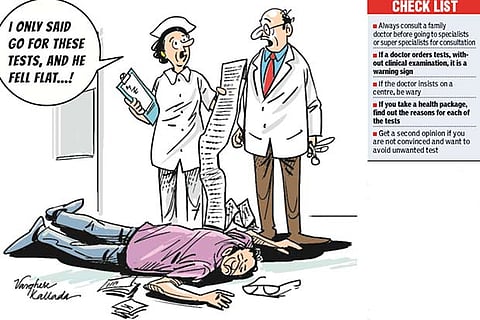

Chennai
When Mary (name changed) failed to conceive, she and her husband approached a fertility expert, who asked her to undergo a transvaginal ultrasound. After being prescribed some medications, when she thought of seeking another opinion, she approached another expert a month later, who ordered the same procedure again. “When I told the doctor, I had got one done just the previous month, she said they needed a fresh one. So, I underwent another scan for the second time in just two months,” she says. She spent thousands of rupees and many patients feel screening is over prescribed by doctors.
In fact, shifting the spotlight on health check-up packages offered, a recent study published in the National Medical Journal of India pointed out unnecessary and inappropriate screening tests may cause more harm than benefit.
Tie up with centres?
A random check of hospitals and smaller clinics would reveal the nexus, points out P Pavalam, an activist. “In one such check, we found unmarked envelopes containing money from diagnostic centres. An MBBS doctor can make a living just through the commission received from the centres,” she alleges.
Dr Guru Shankar, President, Association of Healthcare Providers of India – Tamil Nadu Chapter, agrees that a few doctors have tie- ups with centres to receive a cut for referrals. “Stand-alone diagnostic centres have a separate model. Doctors seeking cuts from the centres is unethical. But that’s a small section and such practices by a few shouldn’t put every test or scan ordered by a doctor under the scanner. It will cause havoc,” he points out. He says that the easiest way for patients to avoid such a situation is to watch out for doctors who insist that they get the tests done at a particular centre.
Diseases don’t follow any textbook pattern, says Dr Anita Suryanarayan, vice president, operations, South, Lister Metropolis. “Moreover, people are impatient to get well and they don’t want to spend time recovering. Physicians don’t have much a choice and are in a quandary -- if he or she doesn’t ask them to undergo the tests, they face the heat. Viral fever can be anything after five days; no one wants to go for ultra-diagnostics, but they want to rule out possibilities in one shot. There is an incubation period for antibodies and no doctor wants to miss them,” he says.
It is a defensive act
The Indian Medical Association, however, maintains that the growing number of complaints against unwanted tests and scans are a result of the Consumer Protection Act that gives more teeth to claims by patients. “This is not to deny that unwanted tests are not ordered for by doctors. We look for such practitioners, upon receiving complaints, and act against them. However, in most cases, doctors are forced to ask for tests as defence against a possible litigation,” says Dr JA Jayalal, state president elect, Indian Medical Association. He adds that the medical advancements have made several tests a part of treatment. “Earlier for appendicitis, an ultrasound scan that costs Rs 750 was sufficient, now an MRI costing Rs 6,000 to 7,000 is necessary. Similarly, for many ailments CT scan alone is not considered enough and a doctor might want a PET Scan costing Rs 25,000 to be done,” he says. He also points out while in many centres, the ties up have ended, the costs of the tests continue to be high.
Dr Amalorpavanathan Joseph, a vascular surgeon, who retired from government services, agrees that some tests are unwanted. Having served in both private and government practices, he points out the difference in approach when it comes to tests. “One disease that I commonly see in my speciality is acute embolism. It must be operated within six hours. In private practice, I must do an angiogram to keep it on record as some patients come back and ask where is the evidence of the clot. The facility maybe available in private hospitals easily, but not in the government facilities. So, in government practice, I would continue with the procedure without it,” he says. He adds that an array of tests is often an indication of being unsure or afraid.
Dr Jayalal suggests a comeback of family medicine in mainstream healthcare. “If you directly go to a neurologist for headache, he is going to make you undergo scans. We must look at reintroducing family doctors in the chain of healthcare, like in the US, to avoid this situation,” he says.
Visit news.dtnext.in to explore our interactive epaper!
Download the DT Next app for more exciting features!
Click here for iOS
Click here for Android